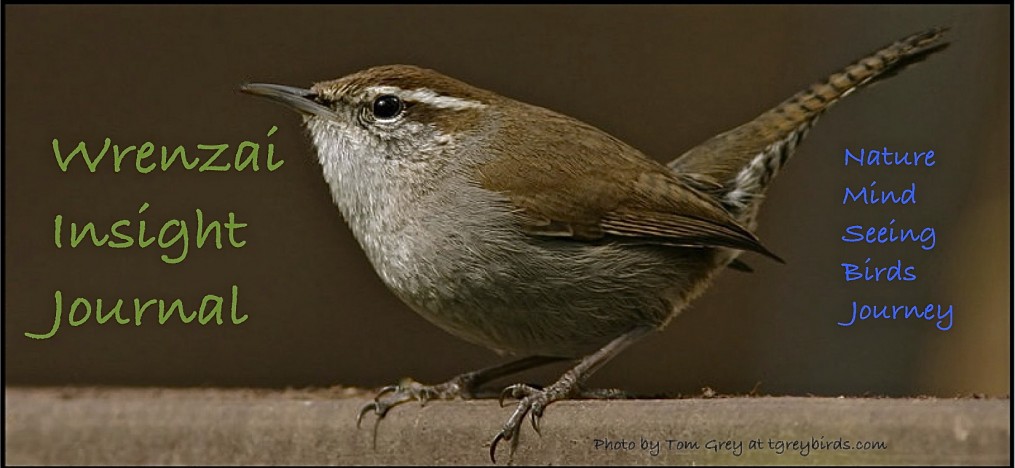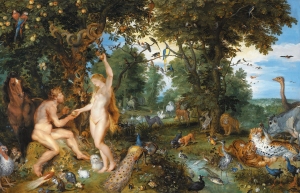Recently, a fellow bird-lover sent me a link to Jonathan Franzen’s April 6, 2015 New Yorker article entitled “Carbon Capture: Has climate change made it harder for people to care about conservation?” which is concerned with how our apathy toward global warming extends to the extinction of birds and other species. Franzen suggests each and every one of us is implicated in global warming but that most of us feel impotent to do anything about it—and birds and other animals are the victims of the resulting apathy. The author goes on in his article to exhort us not only to act locally but also to think locally as well so that, as individuals or in smaller groups, we can make a difference where making a difference is most critical and possible.
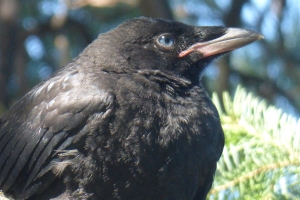
American crow fledgling, with blue eyes (all bird photos by Rick Clark)
But birds aren’t important only from the Protestant, New England Puritan, and Saint Franciscan points of view that Franzen mentions. Birds are also important from the Positive Existentialist point of view, which I suggest undergirds the most universal of value systems and which gives us a way to see all life on Earth as endangered and as worthy of saving.
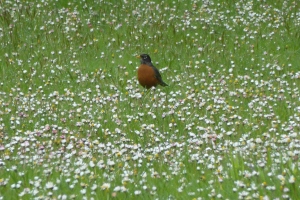
American robin in meadow
The Existentialist writers and philosophers of the 20th century—Sartre, Camus, de Beauvoir, and Gide, to name a few—posited a world in which there is no supernatural—no God or gods, no soul, no heaven, no hell, no “given” purpose or meaning. This point of view was experienced as so alien, pessimistic, and bleak at the time that most rejected it out of hand. However, I’d like to suggest that what many view as an agonizing dilemma might just as easily be viewed in a positive, redemptive light and that adopting the Positive Existentialist orientation might save the birds (and us) from extinction.
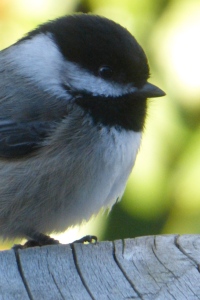
black-capped chickadee
The problem with Existentialism is that, according to its view, nothing is more or less valuable or important than anything else, at least not from an extrinsic standpoint. This is the most troubling critique aimed at Existentialism: that the Existentialists failed to work up a system of values. But I think that’s because they failed to see that if the supernatural doesn’t exist, then we humans made up God, and if we made God up, then we’re the source of the values and morals we’ve projected on God in creating him. I might refer to this instinct as “the moral organ” (an idea I borrow from Joseph Campbell, who suggests the myth-making impulse is a kind of psychic organ). The relativism inherent in Existentialism applies to the value we put on human life in relation to the value we put on other animal life, including birds. Yet there’s no evidence without the created authority of an all-powerful supernatural being that one species is more valuable or important than any other—or that in the context of the universe anything whatsoever is important or valuable at all. It simply is.
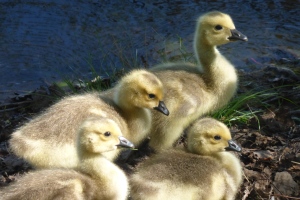
Canada goslings
The beauty of Positive Existentialism is that our view of the universe and our place in it becomes so much simpler and easier to understand. We humans are simply the most complex and sophisticated of some seven million species striving to survive (or thriving) on a relatively tiny star-lit ball of molten iron, rock, soil, water, and air rolling through space around one of trillions of stars in a universe billions of light-years vast. But not having a colossal supernatural being out there doesn’t mean we’re any less moral. It just means it’s up to us to act according to the authority we otherwise divest in “God.” If it’s we who conceive of God, religions, and moral systems, then it’s we who are moral to begin with. Morality is in our nature, much as the instinct to survive is in our nature. The Positive Existentialist orientation puts us in the driver’s seat, fully responsible for our own existence on this planet and in the universe. And if we returned to being a race of Nature rather than sycophants of the supernatural, there’d likely be a lot less conflict and fewer large-scale wars, since believing in different gods, differing versions of God, and contrary interpretations of “sacred” texts, wouldn’t be reason to kill each other off.
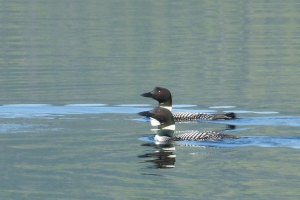
common loons
Once we get comfortable with a godless universe, we realize the world is ours to create, in our own best image, with all the goodness that we’ve created an all-powerful supernatural being to expect of us. We decide what’s important to us, to our individual selves as well as to the whole of civilization. We make our own meaning, we strive for the highest universal ideals and values, and we work hard to make our planet a paradise. Not to strive to make our planet a paradise is to fail as a race. Not to hold universal ideals and values is to fight and compete amongst ourselves till we destroy life on Earth as we know it. We know in our heart of hearts that we have the choice to become bad people and create hell on Earth or to become the best people we can become and strive to create Paradise on Earth.
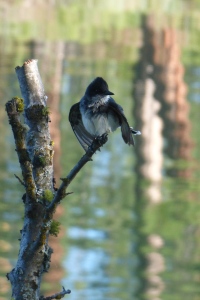
eastern kingbird
While the Existentialists, especially Albert Camus, also posited Absurdism (the view that there’s no reason to exist in a meaningless world), the instinct to survive is not absurd. It is inherent. And to act to see that other creatures survive, including saving our birds, is heroic. Therein lies our meaning: In the context of our biological, ecological, economic, and spiritual imperatives, we need to create a world in which most or all peoples and species can survive and live together relatively healthily and peacefully.
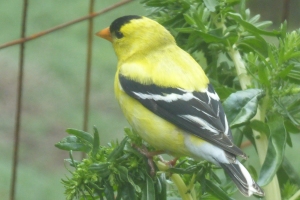
American goldfinch
As my philosophy professor, during my undergraduate years at Portland State University, suggested, the instinct of the survival of the species might in fact be the basis of human morality. I go a step further to suggest that recognizing other creatures’ instinct to survive as a species is just as important as recognizing our own need to survive as a species. We’re all Earthlings, so let’s extend the very secular Golden Rule to include other creatures, which is to say let’s have empathy not only for other human beings but also for other creatures on our planet (many of us do). We are arrogant to think our “ownership” of the land means that other creatures have no right to inhabit it. We humans created the once non-existent idea of property ownership, but plants and animals have no say about where the borders and property lines fell. This isn’t to say that property ownership is bad. Property ownership is natural, since most motile creatures on this planet are instinctually territorial, human property ownership being the formal extension of our territorial instincts.
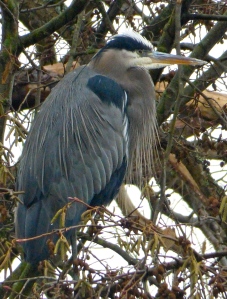
great blue heron
As a longtime college English instructor, I copied and passed out a handout to my Intercultural Communications and Ancient Literature students that includes versions of the Golden Rule from sixteen different religions. The Golden Rule is, indeed, the first and most fundamental spiritual tenet, undergirding most if not all religions and spiritual systems and deriving, not from some external supernatural source, but from our own sense of one another’s vulnerability, imperative to exist, and longing for peace, fullness, and comfort. It is our highest empathic and compassionate means of relating to each other and to other creatures. The Golden Rule is an expression of our recognition that all creatures on Earth desire to survive, even thrive, on our shared planet. It is a universal, a sense we all have, or should have, in common. Live and let live.
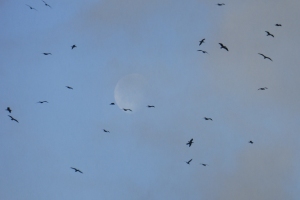
gulls and moon
I’m not advocating communism or any other system that doesn’t recognize Nature or human nature. I’m not advocating a Bacchanalian return to Nature, nor am I promoting anarchism or nihilism. Nature is very orderly, with territories, pecking orders, social structures, rites and rituals, symbiosis and mutualism, and, lest we forget, the food chain and its many fragile links. I’m simply advocating a heightened consciousness of and approach to our killing, exploitation of resources, destruction of habitat, mindless consumption, and ignorance of other creatures who might inadvertently be destroyed in the process of our exploitation and consumption, and I do so for the sake of the survival of our species and relative peace on Earth. It’s a matter of consciousness, empathy, intention, and, yes, action. True, we cannot achieve the ultimate ideal of a paradise in which there is no suffering or death, because, of course, we have to kill in order to eat and we all have to die in order for others to live, but we can lean toward some balance that enables most or all of our species to survive our otherwise careless destructiveness. If we believe in the human will and the ultimate good, then we are obliged to lean—heavily, at this late date—toward some sort of healthy balance between humans, other creatures, and Habitat Earth.
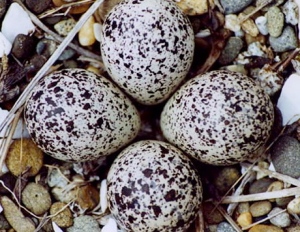
kildeer eggs
It’s impossible not to kill and eat plants and animals in order to survive. Life eats life. But we need to do it the way that some early peoples did, with respect, humanity, and even a kind of grief for being caught in the web of life in which we Earthlings must kill each other in order to survive. Many religions and tribal beliefs, in fact, are founded on this idea. Many rituals include sacrifices of animals emblematic of our taking of life to survive. Suddenly the taking of a life has the symbolic weight it deserves. But such rites don’t require that we believe in some obscure supernatural being—just that we treat all life with the respect that we seek for ourselves.
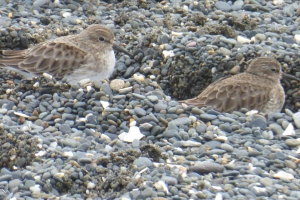
least sandpipers hunkering down in footprints
While there will always be those who set out to destroy others and the environment, we humans will always be most attracted to the brightest light, that of Aristotle’s “ultimate good.” As long as we can conceive of the light of goodness, we will always be drawn to it. Goodness shines its light on badness and shows it for what it is. Every clear-eyed, responsible, relatively intelligent human being knows this. Even dogs can learn the difference between good and bad. It’s when we know what good is and we choose to do bad anyway that amounts to the worst crime. Conversely, when we’re tempted to do bad and do good instead, we know we make the best choice, we confirm our belief in the human will, and we acknowledge our humanity.
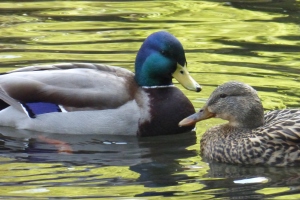
mallard couple
I know there’s a degree of circularity in this logic, but it’s the best we can do without reconstructing the illusory authority of a colossal supernatural being, which, indeed, also involves a kind of circular logic (we exist; therefore there must be a God or gods to have created us). Ultimately, we must find our meaning and purpose in the context of our Earthly existence, in grooming the health of our planet and its many species.
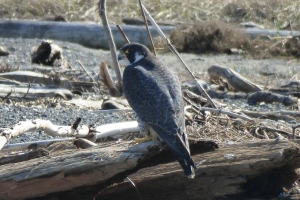
peregrine falcon
Surprisingly, I’ve talked to relatively wise, intelligent, productive people who’ve told me they don’t believe in the human will. Some people can imagine a better world, or a better outcome for their efforts, but they say they’re helpless to achieve it. I, for one, believe in the human will. Not to believe in the human will is to suggest that nothing that came about on this planet came about as the result of human intention, and so much of what’s come about has come about in the last 120 years. 120 years of evolution and tumultuous change didn’t occur accidentally. If there’s one ideal that humans should believe in, it’s the human will. If we don’t believe in the human will, the belief that we can choose and create a better world, we may as well embrace the idea that there’s nothing that drives us but our basic animal instincts, that our bicameral brains and cortexes are for naught, that civilization is an illusion, and that the birds are doomed to perish, which is to suggest that this ever more complex world that we seem to be creating is nothing more than billiard balls ricocheting off each other, off the “bumpers” of the laws of nature into the bumpers of our idle constructions, physical and abstract.
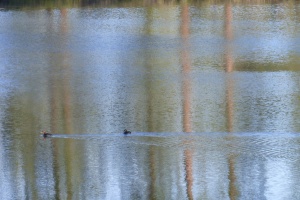
red-necked grebes
Let’s face it, if we are conscious and have free will, then we are not innocent, unlike birds and other animals, who kill to eat and protect their young out of instinct (or so the theory goes). In fact, it would follow that the more conscious we are, the more responsible we are for our actions in the world, the less innocent—that is, the more guilty—we are for doing nothing to counter our own actions or the actions of others. How we live with our guilt, our remorse, I can’t claim I have no idea, because I too am as guilty as the next human being. I have killed—and killed for no good reason or without a second thought.
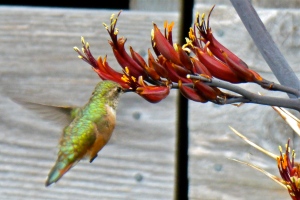
rufous hummingbird
Some readers will argue it’s obvious that we humans are more important than birds and other animals because we’re more intelligent (according to our own standards and measures), we create and evolve technology, we have reason, language, religions, philosophies, countries, cities, governments, corporations, communication and transportation systems, schools, libraries, weather stations, and we’ve leashed the power of the wind, the wheel, metallurgy, plumbing, electricity, flight, space travel, and the atom. We may consider these characteristics and developments as indicative of how much more valuable we are than birds and other creatures, but our abilities and institutions are valuable only in our own eyes and according to our own value systems—intrinsically. There’s no great cosmic judge out there saying, “Wow, your technology is a clear sign of your goodness in the universe,” or “The high values to which you pay lip service are indeed the highest values in the universe.” They’re only valuable to us humans, not to other species, which have only been maimed, sickened, and killed off by our presence and our technologies. Certainly the pig wasn’t too thrilled about the invention of the sty, nor the horse the bit. The fact that humans can be viewed as more evolutionarily complex or sophisticated, or that we humans appear to have freedom of choice and can take responsibility for our actions—might make for good arguments, but complexity, sophistication, and freedom of choice are nevertheless human, species-centric values.
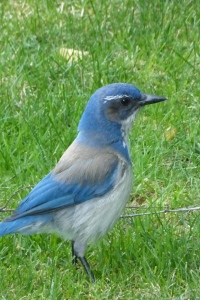
scrub jay
We can view ourselves as valuable and important only to the extent that we conceive and act on the highest universal values, ideals, and visions for the majority of people and species on our planet. This is what I think of when I think of Positive Existentialism. We can measure our goodness only within the context of our actions on Earth. War may occasionally be the only choice as far as we can see, but war is never good. We can’t say, “We’re a great people because we destroyed a country or a people and won the war.” Millions of people may be starving and dying due to disease on our planet, yet we are no better as people just because we’re not the victims. At minimum, we each—most of us—need to be self-sufficient. Beyond that, we need to contribute positively, in some small way at least, to creating Paradise on Earth.
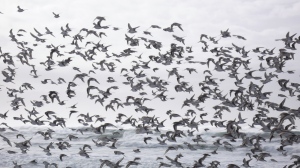
shorebird flock
We must choose to create Paradise of Earth. We must act on our choice to create Paradise on Earth. To do anything else is to succumb to apathy, inaction—or self-serving action—that is, to remain blind to, and even hate, Nature—a great sadness, indeed.
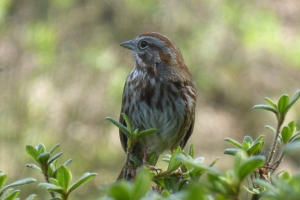
song sparrow
Animals, including birds, have every bit as much right to survive, to live, as we do. Just because we’re human doesn’t mean that other species don’t have a right to exist. Just because other creatures lack the technology we possess to kill them doesn’t mean we have the right to kill them meaninglessly or accidentally. This seems to be the attitude of humans for the most part: We think that just because we’re human we have the right to destroy other life and wildlife habitat (which amounts to the same thing). This mindset is not a sign of intelligence, but of ignorance, stupidity, arrogance, and sheepishness. It’s like a man stranded on a desert isle who cuts down the one and only tree that produces coconuts and upon which a parrot perches to keep him company and who cuts that tree down to make a raft to reach yet another desert isle with no palm or parrot on it. It doesn’t make sense to destroy this planet thinking we can simply go in search of and destroy another planet elsewhere. This is not a test we can fail.
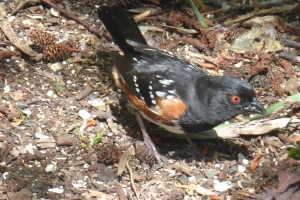
spotted towhee
Birds have been around since long before our hairy ape ancestors ever clambered down out of their trees and walked out onto the grasslands to scavenge lion-killed wildebeests. Birds may have evolved from dinosaurs, but I wonder what kind of dinosaur humans evolved from?
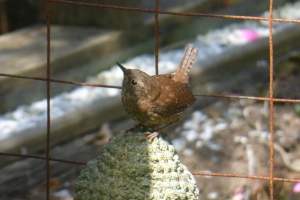
winter wren
I take seriously the canary in the mine argument. The frogs, in the early 1980s and on, were the canaries in the mine when, due to human-made air pollution, holes opened up in the ozone layer and countless frogs died or were born deformed and dysfunctional. I’d like to suggest that, if we let bird species continue to go extinct (let alone cause them to go extinct) along with the pollinating bees, then we’re not too far behind them with our own demise (Endangered Species International lists 25 species of birds whom we humans have caused to go extinct since 1900). We are foolish to count our blessings when we think, “At least it’s not me dying due to global warming!” This is arrogant, short-range denial. And how stupid can we be to think we can simply move to another planet once we destroy this one! Or even to live under glass domes in order to survive the harsh climate and geological conditions that we helped create outside those domes. Are we so important as to deserve hell?
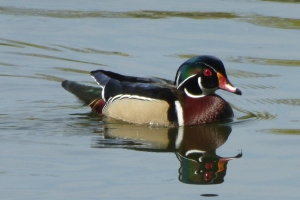
wood duck
Beautiful, beautiful birds! What creatures besides birds lay eggs, sing, and fly? Insects lay eggs, and many fly, but none sing like birds (a few verge on melodious, such as the cicada). What other creatures display more brilliant and varied colors than birds (except butterflies and fish—other Earthlings whose species are endangered)? But even these criteria derive from a human aesthetic that values incomparable song, swift, soaring, and acrobatic flight, and dazzling plumage.
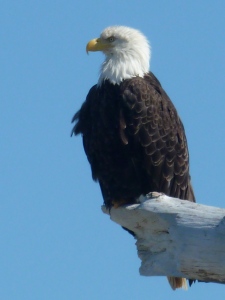
bald eagle
My favorite kinds of birds are the little ones that visit our house in the woods—the sparrows, finches, chickadees, thrushes, towhees, wrens, and warblers that typically dwell in forests, marshes, and meadows—the most apparently helpless, most childlike birds (except for those ubiquitous English sparrows, who, like the cockroaches, seem to be one of Earth’s ultimate survivors), the birds that for the most part seem not to eat human refuse. Many don’t eat the birdseed I put out for them because they’re not seed-eating birds or because they have an innate distrust of anything touched or created by human hands. They eat bugs—or seeds not supplied by the feeder. While I can’t really establish a relationship with an individual small bird the way I can with a crow, raven, or parrot, they’re always nearby, keeping me company while I work or entertaining me visually around the feeder, in the alder above, and in amongst the salal and rhododendrons at ground level. These birds are my personal canaries in the mine. Every year I participate in the Audubon annual bird count just to help make sure the numbers are still up and that none of the usual suspects have disappeared. The loneliness I’d feel without birds would be excruciating. I’m not sure I could go on living on a planet in which we humans have destroyed all the birds, where birds are merely the subject of ancient myths to which we hark with dreamy eyes and nostalgic literature, such as the beautiful passenger pigeon.
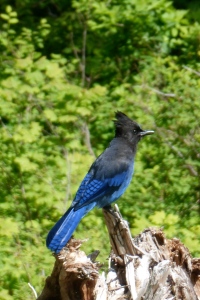
stellar jay
If we can’t save the birds and all or most of life on this Earth from which we were also born, then how important and valuable can we be? Having the ability to destroy life might make us feel powerful, but it hardly makes us “good.”
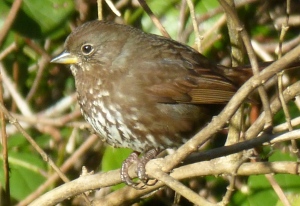
fox sparrow
Hatred, destruction, and negligence of Earth are not family values. Letting one species of bird become extinct due to human causes is a failure of so-called human civilization. If the definition of civilization doesn’t extend to include other species, then either the definition needs to be reworked or the word needs to be thrown out of the lexicon altogether.
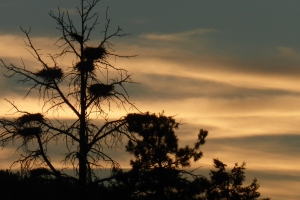
heron rookery
Copyright 2015 by Rick Clark

